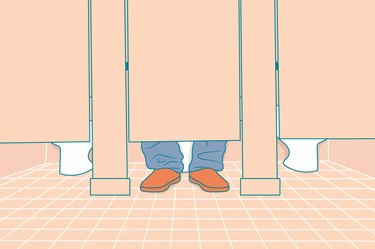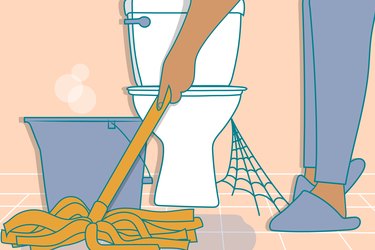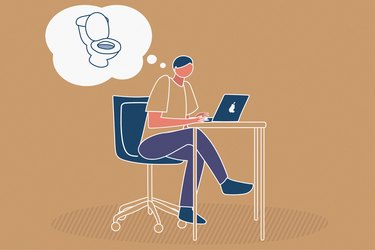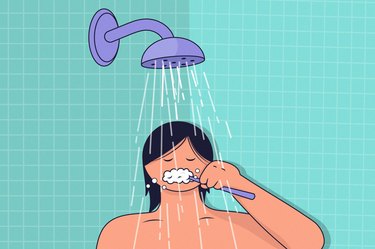
It's no secret public restrooms can sometimes be teeming with germs, including plenty of bugs that could potentially get you sick. But is sitting on a public toilet seat really putting your health at risk?
Surprisingly, the seat isn't the most likely source of illness-causing bugs. Still, sitting down has its hazards.
Video of the Day
Video of the Day
Germs from fecal matter can easily be sprayed out of the toilet bowl and onto the seat (as well as any other nearby surface) when you flush. The phenomenon, officially called "toilet plume," transmits viruses and bacteria that can cause infections, according to a December 2021 review in the Journal of Applied Microbiology.
Toilet plume is most likely to make you sick either by spraying germs into the air (that you breathe in) or by spraying germs onto nearby surfaces that you touch with your hands, the review points out. You're a lot less likely to get infected by germs that land on your thigh or butt.
"Sitting on the toilet seat is not the most direct way to contact germs in the restroom," Kadi Banjoko, MSPH, CIC, infection preventionist in the Department of Clinical Epidemiology at the The Ohio State University Wexner Medical Center, tells LIVESTRONG.com. "The germs would need a way to travel from the seat into the person."
In other words, if you don't have any scrapes or wounds on your legs or derriere, there's no way for the germs on the seat to get into your body and infect you.
That is, unless you touch a germy toilet seat with your hands and then touch your face before washing up, Banjoko says. (Or skip washing your hands altogether. Yuck.)
Still, there's always a remote possibility that you could pick something up from just sitting on the seat, she says. So if you can avoid it, it's worth doing.
What to Do If You Don't Want to Sit Down
If you want to avoid sitting directly on the toilet seat, using a seat cover is your best bet. Not only does it help you avoid contact with the actual seat, but it keeps the seat cleaner for the next person who uses it.
"It's not uncommon to see sprays of urine [on the seat] because someone did not use a seat cover," Banjoko says. Popping one on top of the seat "saves the next person that comes after you the trouble of stepping or sitting on urine," she says.
One thing you shouldn't do? Hover over the seat while you pee. Doing so puts you in a partial squatting position, which can weaken your pelvic floor muscles over time. It also makes it harder for your bladder to fully empty. That can increase the risk for problems like incontinence or urinary tract infections, according to The Ohio State University Wexner Medical Center.
Other Tips for Avoiding Germs in a Public Bathroom
The public restroom toilet seat is probably harboring germs. But don't let it blind you to all the other hotspots in the bathroom that are likely to be much, much germier.
Bathroom door handles, toilet knobs, faucet handles and soap dispensers are virtually guaranteed to be contaminated with infectious bugs, according to a June 2020 study in the Journal of Family Medicine and Primary Care.
In other words: If lots of people are touching it with their hands, it's probably a cesspool. (Even bars of soap can be germ pits, but thankfully, you almost never see those in public bathrooms!)
In that case, the best way to protect yourself is by washing your hands thoroughly after using the bathroom. "And use a paper towel if available to close the tap," Banjoko says. Ditto for the door handle on your way out.
In short: The less stuff you touch, the better.
So, How Bad Is It Really to Sit on a Public Toilet Seat?
You're a lot less likely to get sick from sitting on a toilet seat than by touching a bathroom surface with your hands and not washing them.
Still, it's wise to avoid direct contact with the seat if you can, Banjoko says: "Most surfaces in the public restrooms are contaminated. It's best to use seat covers if they're available."
- Journal of Applied Microbiology: "Toilet hygiene—review and research needs"
- Ohio State University Wexner Medical Center: "Women: Don’t hover over the toilet seat"
- Journal of Family Medicine and Primary Care: "A survey of public restrooms microbial contamination in Tehran city, capital of Iran, during 2019"
Is this an emergency? If you are experiencing serious medical symptoms, please see the National Library of Medicine’s list of signs you need emergency medical attention or call 911.



